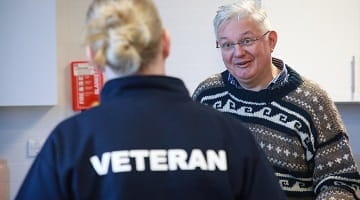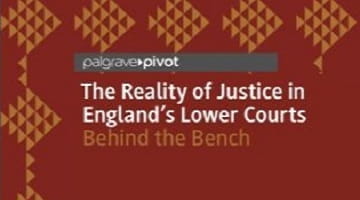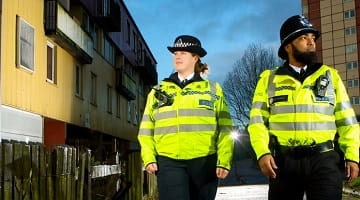Why study this course with LJMU?
- Licensed by The College of Policing, the professional Statutory and Regulatory Body (PSRB) for Policing
- The programme covers wide-ranging areas of law, social science, policy and research skills essential to a policing career
- You will be taught by lecturers and practitioner academics, who are former serving officers of all ranks and roles, from Constable to Chief Constable
- Field trips include Merseyside Firearms Training Centre and the Emergency Services Training Centre as part of your core modules
- Opportunities to volunteer as a Special Constable in Merseyside Police and other local forces
- Guest lecturers include speakers from the National Crime Agency and operational input from Merseyside Police - which includes stop & search scenarios with serving officers
- Final research project allows students to collect their own data to explore specific issues relevant for Merseyside police
About your course
This degree aims to make you an attractive recruitment option for police constabularies in England and Wales. A BA (Hons) Professional Policing is the defined pre-join qualification for a career in policing.
It gives graduates a solid foundation and a head start from which to embark upon their careers when they are appointed to a police force. The programme covers all academic and theoretical elements of the College of Policing initial curriculum. Therefore, once appointed to a police force graduates require only minimal practical training and orientation in their chosen police force.
You will have the opportunity to combine your studies with service by volunteering as a Special Constable, which enables you to achieve many of the practical initial operational requirements, which links back to your academic studies.
Each student is allocated a personal tutor whose role is to offer general advice, guidance and support regarding the broader aspects of your studies and university life in general.
You will be taught at Mount Pleasant Campus in the Liverpool Centre for Advanced Policing, a pioneering research centre for interdisciplinary law enforcement, and is licensed by the College of Policing to deliver degree programmes.
Course modules
What you will study on this degree
Further guidance on modules
Modules are designated core or optional in accordance with professional body requirements, as applicable, and LJMU’s Academic Framework Regulations. Whilst you are required to study core modules, optional modules provide you with an element of choice. Their availability may vary and will be subject to meeting minimum student numbers.
Where changes to modules are necessary these will be communicated as appropriate.
Core modules
Introduction to Policing
20 credits
20 credits
Within this module, you will examine the history and development of the British policing model and the underpinning features and philosophy. You will examine the modern policing and wider law enforcement landscape, the organisations and bodies that comprise it, what each does and how they interact. You will also develop an understanding of the role and position of the police in contemporary society and the nature of the relationship with the community they serve.
Academic and Policing Studies Skills
20 credits
20 credits
This module aims to provide you with the necessary knowledge needed to enable you to demonstrate a structured approach to studying, writing essays and referencing content.
Criminal Law, Practice and Procedure
20 credits
20 credits
This module will provide you with the knowledge and understanding of legislation and police powers in relation to a range of typical policing incidents. It will enable you to apply such knowledge to a range of specified circumstances and incidents.
Policing Standards, Governance and Accountability
20 credits
20 credits
To consider what is meant by professional standards and how the apply to police officers and the police service. To examine the governance and accountability of police officers and the police service generally. To compare the professional standard requirements within the police service to those of similar professional organisations. Examining the role of each of the various bodies involved in the governance and accountability of police officers and the police service. To understand the meaning of diversity and inclusion and their relevance in policing. To understand the meaning of wellbeing and resilience and their relevance in policing. To understand the meaning of ethics and their relevance in policing. You will consider both the theory and application of ethics and the fundaments and relevance of effective communication.
Evidence Based Policing
20 credits
20 credits
The module will provide you with an appreciation of the concept of evidence-based policing. You will consider the problem-solving approaches to policing. Consider the relative benefits, deficiencies and applicability of various policing strategies and models
Criminal Justice
20 credits
20 credits
The aim of this module is to learn about the components of the criminal justice system, how they operate and how the relate to each other. You will learn about the specific roles of the various agencies and institutions within the criminal justice system and you will explore the process of getting people to custody and the routine processes around detention.
Core modules
Research methods
20 credits
20 credits
This module will evaluate the strengths and weaknesses of research methodologies and approaches, demonstrating effective referencing, applied to a range of theories and practices and associated with communication. You will also gain knowledge and understanding of quantitative and qualitative research techniques and their appropriate use.
Victimology
20 credits
20 credits
This module will define what is meant by vulnerability and familiarise you with the complex nature of vulnerability, whilst providing an understanding of how situational and environmental factors, combined with personal vulnerabilities, may result in a person becoming a victim and/or perpetrator. You will explore how the effective use of training, knowledge and skills can assist in supporting those who are vulnerable and why it is necessary to use a safeguarding approach to those who are vulnerable.
Policing communities
20 credits
20 credits
Develop the knowledge and understanding of policing in a Community Policing context. Develop existing knowledge of policing strategies and develop this further.
Information and Intelligence
20 credits
20 credits
This module will develop knowledge and understanding of the theory, legislation, policy and practice relating to information and intelligence in policing.
Offenders management
20 credits
20 credits
To understand the criminological theories, strategies offending and policing strategies and approaches to managing suspects and offenders. To understand the importance of partnership collaboration to manage risk and vulnerability
Policing the roads
20 credits
20 credits
This module will develop your knowledge relating to Roads Policing and understanding to conduct investigations in a Roads Policing context.
Core modules
Research project
40 credits
40 credits
The module will ensure that you have the knowledge, understanding and skills to conduct research into more complex issues within the context of a policing related topic. It will provide the opportunity to develop an ethically sound research question and to develop appropriate research methods to justify your choice.
Career and employability
20 credits
20 credits
The module will consolidate the academic and transferable skills acquired throughout the programme with a view to preparing students for the work environment. Developing a compelling onward plan.
Conducting investigations
30 credits
30 credits
The aim of this module is to develop knowledge and understanding of the investigative process in a range of operational contexts. You will develop practical solutions to provide effective policing methods in this area whilst furthering your own competence within the pathway.
Response policing, leadership and team-working
30 credits
30 credits
Develop the knowledge and understanding relating to a Response Policing context. Develop knowledge and understanding of the social issues and pressures relating to response policing demand.
Professional accreditation
The College of Policing, the professional Statutory and Regulatory Body (PSRB) for policing, has licensed LJMU to run this degree as an entry level professional degree
Your Learning Experience
Excellent facilities and learning resources
As part of this programme you have access to our innovative Crime Scene Suites on campus and also take part in role-play and scenario tasks at the Emergency Training Centre in Birkenhead.
The programme is delivered by academic staff and practitioner academics, who are former serving officers of all ranks and roles, from Constable to Chief Constable. All staff are experienced in a wide range of subject areas and specialisms.
Throughout the programme there is a student mentoring scheme that supports students in their academic, professional and personal development.
There is also a wider School of Justice Studies Mentoring Programme that works with criminal justice agencies, such as policing, crime prosecution services, prison, probation and youth justice.
Both employers and students should benefit significantly from this programme. Students gain employability skills and insights into specific careers, while employers experience the rewards of mentorship and the opportunity to share their knowledge with enthusiastic students.
Work-related Learning
This degree incorporates specific and specialist work-related topics into every level of learning, as well as equipping you with a versatile range of transferable skills and knowledge in analysis and interpretation, presentation, teamwork, initiative and research.
Blended learning
We adopt an active blended learning approach, meaning you will experience a combination of face-to-face and online learning during your time at LJMU. This enables you to experience a rich and diverse learning experience and engage fully with your studies. Our approach ensures that you can easily access support from your personal tutor, either by meeting them on-campus or via a video call to suit your needs.
Dedicated personal tutor, plus study skills support
It is often useful to discuss course-related issues on a one-to-one basis and for this reason we will assign you a personal tutor for the duration of your studies at LJMU. Your tutor will also help you put together your personal development plan so that you can monitor progress and set your own targets. Module tutors also provide support in the form of online learning materials, course guides and one-to-one consultations if you need them, and there will be study skills sessions to help you prepare for assessments.
Assessment varies depending on the modules you choose, but will usually include a combination of exams and coursework.
We understand that all students have different strengths and preferences when it comes to assessments, so we use a variety of methods to assess your work structured across the academic year. These include essays, exams, fieldwork projects, reports, case studies, portfolios, online blogs and wikis, workplace practice, posters, presentations (individual and group), debates, reviews and group work.
You will normally receive extensive written feedback on your assessments, and occasional verbal feedback. All feedback is designed to help you achieve your full potential and get the most out of your studies, so staff will be available to discuss it with you and direct you to further support if you feel you need it.
Where you will study
Based at the John Foster Building, in the Mount Pleasant Campus, the Crime Scene Suite is an innovative facility that gives students the opportunity to explore crime scene perspectives and investigate approaches.
Course tutors

Charlotte Watkinson-Miley
Programme Leader
Policing is a really exciting industry to be involved with and the undergraduate policing programmes at Liverpool John Moores University are an outstanding introduction to this field and provide you with the skills you need to be successful in pursuing your ambitions
Policing is a really exciting industry to be involved with and the undergraduate policing programmes at Liverpool John Moores University are an outstanding introduction to this field and provide you with the skills you need to be successful in pursuing your ambitions
Charlotte Watkinson-Miley is a Senior Lecturer in the Liverpool Centre for Advanced Policing Studies.
Charlotte began her time at LJMU as a Research Fellow on a joint College of Policing and HEFCE funded Police Knowledge Partnership between LJMU, the Office of the Merseyside Police and Crime Commissioner and Merseyside Police (November 2015 - April 2017). The project involved a mixture of LJMU Research Fellows and Seconded Officers (working at LJMU at Advanced Practitioners) from Merseyside Police. Together the team delivered formal research training and supervision to cohorts of police officers and police staff grouped around the defined priority themes of hate crime, child sexual exploitation, effective crime prevention, and the challenges of cyber-crime/security/surveillance. The Police Knowledge Fund project was underpinned throughout by the ambition to promote officer engagement with, and implementation of, evidence-based practice.
Following the completion of the Police Knowledge Fund Project, Charlotte gained a role as a Practitioner Fellow, given previous professional experience of working for the Merseyside Police and Crime Commissioner. Charlotte is now the programme leader for Professional Policing Programme.
Charlottes research focus is Evidence Based Policing and problem solving, which can support various policing areas. Charlotte has submitted her PhD which is focused on exploring police-academic partnerships, exploring the challenges and opportunities of collaborative working between academia and policing. Charlotte has first-hand experience of working in partnership with policing, establishing joint working for research purposes. The thesis explores the differences between the policing and academic spheres, which arguably require different working approaches. The research explores a new ‘pracademic’ space where policing practitioners and academics can successfully collaborate.
Charlotte has also researched Police culture, particularly exploring degree apprentice officers who are at different stages of their apprenticeship to explore how they believe their degree informs and supports them fulfilling their role as a police officer. Charlotte is also supporting research projects exploring police officer mental health and wellbeing.
-
 Lecturer
Lecturer -

-
 Lecturer/Senior Lecturer
Lecturer/Senior Lecturer -
 Practitioner Fellow LCAP
Practitioner Fellow LCAP -
 Lecturer/Senior Lecturer LCAP
Lecturer/Senior Lecturer LCAP -
 Lecturer in Policing
Lecturer in Policing
Career paths
Graduates find themselves working a variety of policing roles, such as operational officers, police staff, or wider law enforcement agencies.
Employability is a core module of the degree, where in your final year you will be encouraged and supported to consider your career path in policing.
For graduates who wish to apply for police constable roles in England and Wales, need to do so within five years of graduating. Achieving this degree is a requirement but does not guarantee appointment to a police force. Recruitment and appointment is subject to the relevant regulations and requirements of police recruitment and selection processes. This includes medical and fitness testing along with background and security checks. Recruitment and selection processes are rigorous and may vary between forces.
Candidates applying to join a police constabulary must also undertake a series of assessments including National Recruitment processes and Force vetting. Guidance on recruitment can be found on the College of Policing website.
For graduates who seek careers outside of police constable roles, may find themselves working in:
- Border Force Control
- National Crime Agency
- Police Staff - Researchers, Analysts or Advisors
Student Futures - Careers, Employability and Enterprise Service
A wide range of opportunities and support is available to you, within and beyond your course, to ensure our students experience a transformation in their career trajectory. Every undergraduate curriculum includes Future Focus during Level 4, an e-learning resource and workshop designed to help you to develop your talents, passion and purpose.
Every student has access to Careers Zone 24/7, LJMU's suite of online Apps, resources and jobs board via the LJMU Student Futures website.
Tuition fees and funding
- Full-time per year:
- £9,535
Fees
The fees quoted above cover registration, tuition, supervision, assessment and examinations as well as library membership and student IT support with access to printed, multimedia and digital resources including programme-appropriate software and on campus Wi-Fi.
Financial Support
The University offers a range of scholarships to support students through their studies. You'll find all the information you need on our specialist funding pages, including details of the Student Support Fund and other activities to support with the cost of living.
Additional Costs
In addition to fees, students should also keep in mind the cost of:
- Accommodation
- Travel costs including those for placements, visas and travel for studying abroad and field trips unless paid for by LJMU
- Stationery, IT equipment, professional body membership and graduation gown hire
The University reserves the right to increase tuition fees in accordance with any changes to the maximum allowable fees set by the UK Parliament. In the event of such a change, any fee increase will be subject to a maximum cap of 10% of the total course cost as originally stated at the time of your offer.
Entry requirements
Please choose your qualifications below to view requirements
Grades/points required from qualifications: BCC-BBB (104-120)
Work out how many UCAS points your qualifications are worth by visiting the UCAS Tariff Calculator.
Qualification requirements
GCSEs and equivalents
Please note: Applicants who wish to progress into the police service as a police constable will require passes in Maths and English or equivalent qualifications.
A levels
BTECs
Extended Diploma: DMM
International Baccalaureate
Acceptable on its own and combined with other qualifications
OCR Cambridge Technical
Extended Diploma: DMM
Irish awards
Acceptable on its own and combined with other qualifications
T levels
Further information
-
DBS, Occupational Health requirements
Is a DBS check required?
No
Can this course be deferred?
Yes
How to apply
Securing your place at LJMU
UCAS is the official application route for our full-time undergraduate courses. Further information on the UCAS application process can be found here https://www.ljmu.ac.uk/study/undergraduate-students/how-to-apply.
Your university life
From accommodation and academic support to clubs and societies. Find out what LJMU has to offer.
Related Links
Talk to our students
Connect with a current LJMU student for advice and guidance on university life, courses and more.
See what our students are saying
At LJMU we want you to know you're making the right choice by studying with us. You can see what our students are saying about their experience with us through their reviews on the following websites:
Related Links
News and views
Browse through the latest news and stories from the university










The university reserves the right to withdraw or make alterations to a course and facilities if necessary; this may be because such changes are deemed to be beneficial to students, are minor in nature and unlikely to impact negatively upon students or become necessary due to circumstances beyond the control of the university. Where this does happen, the university operates a policy of consultation, advice and support to all enrolled students affected by the proposed change to their course or module.
Further information on the terms and conditions of any offer made, our admissions policy and the complaints and appeals process.



















